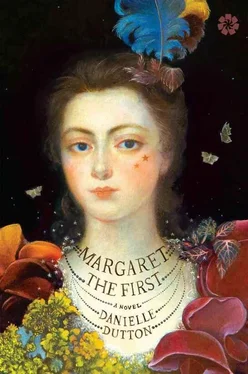I am also indebted to the writing of Virginia Woolf, which is where — in “The Duchess of Newcastle” and A Room of One’s Own —I first met Margaret Cavendish, and in whose life and work I unexpectedly found much inspiration for the woman who took shape inside this book. Furthermore, my book incorporates, here and there, lines and images from Woolf’s own writing (as well as material from Cavendish’s work, of course).
*
Finally, I’d be remiss not to mention the following, which were used to varying degrees in my writing and research:
Ashley, Maurice. Life in Stuart England . New York: G. P. Putnam’s Sons, 1967.
Barker, Felix and Peter Jackson. London: 2,000 Years of a City and Its People . New York: Macmillan, 1974.
Battigelli, Anna. Margaret Cavendish and the Exiles of the Mind . Lexington, KY: University of Kentucky Press, 1998.
Bowerbank, Sylvia and Sara Mendelson, eds. P aper Bodies: A Margaret Cavendish Reader . Ontario, Canada: Broadview Press, 2000.
Bryson, Bill, ed. Seeing Further: The Story of Science & the Royal Society . London: HarperPress, 2010.
Campbell, Mary Baine. Wonder & Science: Imagining Worlds in Early Modern Europe . Ithaca, NY: Cornell University Press, 1999.
Clucas, Stephen, ed. A Princely Brave Woman: Essays on Margaret Cavendish, Duchess of Newcastle . Aldershot, UK: Ashgate, 2003.
Danielson, Dennis Richard, ed. The Book of the Cosmos: Imagining the Universe from Heraclites to Hawking . Cambridge, MA: Perseus Publishing, 2000.
Daston, Lorraine and Katharine Park. Wonders and the Order of Nature . New York: Zone Books, 2001.
Hartley, Sir Harold, F.R.S. The Royal Society: Its Origins and Founders . London: The Royal Society, 1960.
Hazlehurst, F. Hamilton. Gardens of Illusion: The Genius of André Le Nostre . Nashville: Vanderbilt University Press, 1980.
Hunt, John Dixon. Garden and Grove: The Italian Renaissance Garden in the English Imagination: 1600–1750. Princeton: Princeton University Press, 1986.
Inwood, Stephen. The Man Who Knew Too Much: The Strange and Inventive Life of Robert Hooke, 1635–1703 . London: Pan Books, 2003.
Keen, Mary. The Glory of the English Garden . Boston: Bulfinch Press, 1989
Leasor, James. The Plague and the Fire . New York: McGraw Hill Book Company, Inc., 1961.
Orsenna, Érik. André Le Nôtre: Gardener to the Sun King . Trans. by Moishe Black. New York: George Braziller, 2001.
Pearson, Thesketh. Merry Monarch: The Life and Likeness of Charles II. New York: Harper & Brothers, 1960.
Peck, Lynda Levy. Consuming Splendor: Society and culture in seventeenth-century England. Cambridge: Cambridge University Press, 2005.
Pepys, Samuel. The Diary of Samuel Pepys, Volume VII, 1666. Edited by Robert Latham & William Matthews. Berkeley: University of California Press, 2000.
Plumptre, George. Royal Gardens. London: Collins, 1981.
Sarasohn, Lisa T. The Natural Philosophy of Margaret Cavendish: Reason and Fancy During the Scientific Revolution. Baltimore: The Johns Hopkins University Press, 2010.
Scott, A. F. Every One a Witness: The Stuart Age . New York: Thomas Y. Crowell Co., 1975.
Stafford, Barbara Marie and Frances Terpak, eds. Devices of Wonder: From the World in a Box to Images on a Screen. Los Angeles: Getty Research Institute, 2001.
Tinniswood, Adrian. By Permission of Heaven: The True Story of the Great Fire of London . New York: Riverhead Books, 2004.
Turner, John Grantham. Libertines and Radicals in Early Modern London . Cambridge: Cambridge University Press, 2002.
Weld, Charles Richard. A History of the Royal Society: With memoirs of the presidents, Volume I . London: John W. Parker, 1848.
Short excerpts from this book appeared previously in Vanitas, Western Humanities Reviews, and Birkensnake . Thank you to their editors. Thank you to my lovely agent, Cynthia Cannell, and my incredible editor, Pat Strachan. To Andy Hunter, Julie Buntin, Jennifer Abel Kovitz, and everyone at Catapult. To my earliest readers and advisors, J’Lyn Chapman, Kathryn Davis, Gregory Howard, John McElwee, Miranda Popkey, Suzanne Scanlon, and Kate Zambreno. To W. Scott Howard for Paper Bodies . To Washington University in St. Louis, and my colleagues in the English Department, for time and support. And above all, to my forever reader, the wise and patient Martin Riker, for Elijah and everything else.
Danielle Dutton is the author of a collection of prose pieces, Attempts at a Life , and a novel, SPRAWL , which was a finalist for the Believer Book Award. She also wrote the text for Here Comes Kitty: A Comic Opera , an artist book of collages by Richard Kraft. Her fiction has appeared in Harper’s, BOMB, Fence, Noon , and other periodicals. Dutton, who grew up in Central California, holds a Ph.D. from the University of Denver and a M.F.A. from The School of the Art Institute of Chicago. She is the founder of the publishing house Dorothy, and teaches at Washington University in St. Louis, where she lives with her husband and son.












